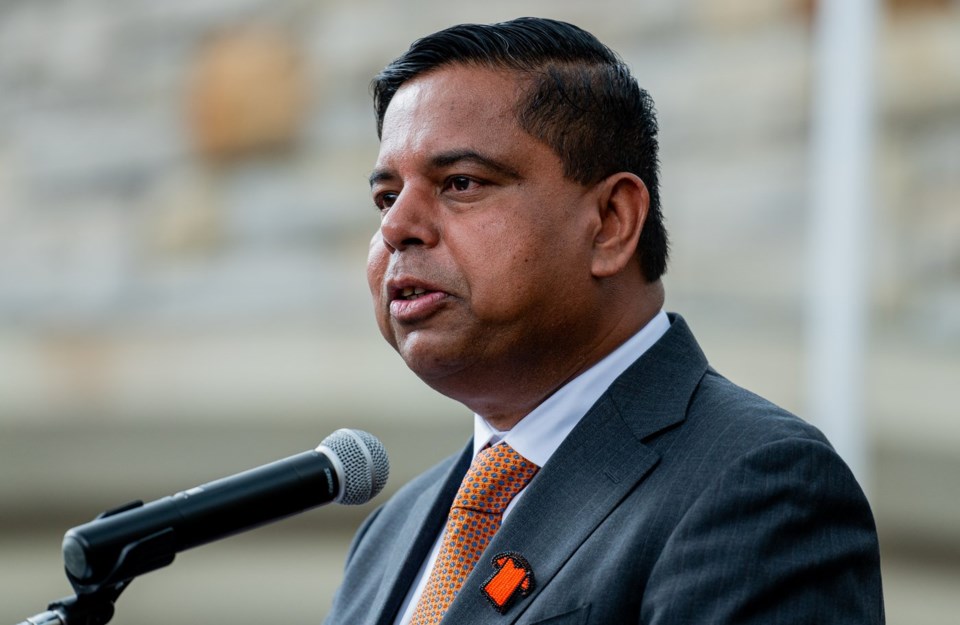OTTAWA — A group of Black and Indigenous women say they want a national public inquiry into a recent spate of police-involved deaths, after nine Indigenous people were killed in interactions with police in August and September.
About two dozen people gathered on Parliament Hill on Tuesday, including the families of eight people who died.
The families say accountability and justice for the deaths of their loved ones is difficult to get, and that concrete actions need to happen to address police brutality and to offer support and resources for the people affected.
Laura Holland, a Wet’suwet’en woman and the mother of Jared Lowndes, said police-involved killings are a state of emergency for Indigenous people.
"We’re being killed on the streets, in our homes, everywhere, and no one is saying anything," she said, adding that it has been impossible to get justice in her son's death.
"When police kill one member of your family, they kill your whole family."
Lowndes was shot by RCMP in 2021. The B.C. police watchdog recommended the Crown consider charges against the officers involved in his killing, but the province's prosecution service decided not to charge them last April.
Crown-Indigenous Relations Minister Gary Anandasangaree earlier said the recent string of deaths was troubling and he encouraged police services to ensure accountability and build trust.
"We must work together with Indigenous partners. We have a responsibility to advance Indigenous-led solutions that address the needs of communities and ensure their safety and security," he said in a statement on social media.
On Tuesday, a spokesperson from Anandasangaree's office said the department will support what communities want and need to address the issue.
A similar call for a police inquiry was raised last week as the Assembly of First Nations gathered in Calgary.
At that meeting, Blood Tribe Chief Roy Fox spoke on behalf of member Jon Wells and his family, and called for a public inquiry into his death.
"We have not received any kind of support or any kind of sign of empathy from the provincial government, nor the federal government," Fox told the assembly's attendees.
MPs also had an emergency debate last month about the deaths, with NDP MP Lori Idlout calling it a "disturbing pattern."
In a letter to House Speaker Greg Fergus asking for the debate, Idlout lambasted what she called a lack of media coverage of the issue and inaction by the government to pass legislation on First Nations policing.
"As parliamentarians, it is on us to show leadership and take responsibility to keep our institutions accountable. People across Canada must know their Parliament is addressing the institutional violence in their communities as a critical and immediate priority," she wrote.
"There is a clear, urgent interest for Parliament to debate this disturbing pattern, so that parliamentarians can discuss immediate measures that can be taken to save Indigenous lives, today."
Cindy Woodhouse Nepinak, the national chief for the Assembly of First Nations, said the deaths demonstrate systemic issues across the country. She demanded accountability from police through independent investigations into each of the deaths.
"Time and again, we have witnessed the consequences of law enforcement’s failure to employ de-escalation techniques and culturally informed practices," she said in a statement last month.
"We will continue to call for action to address these failures and expect full transparency in cases where lives have been needlessly lost."
The families gathered in Ottawa on Tuesday said any potential inquiry must be Indigenous-led and include national data. They also said no federal ministers or opposition parties have agreed to meet with them to discuss the matter.
"This is also an invitation for the federal government to reckon publicly with the statistics that are often obscured," said Meenakshi Mannoe, a community organizer with the Defund 604 Network.
"As Laura Holland mentioned, this violence against Black and Indigenous people is actually quite fundamental to Canada, and it is actually a part of how this state exists. The state exists because Indigenous people are under constant threat of police death and police fatality."
The Canadian Press
